

7 ESA Dog Requirements for Travel, Housing, and Training
by Lena Park
Last updated: July 13, 2025
Verified and Approved by:
Angela Morris,
MSW, LCSW
Fact Checked

Overview
The article focuses on the essential requirements for Emotional Support Animals (ESAs), particularly dogs, in relation to travel, housing, and training. It acknowledges the emotional challenges faced by many individuals and emphasizes the importance of ESAs in providing comfort and support. However, it is crucial to understand that while ESAs offer emotional support, they do not possess the same legal access rights as service animals. Therefore, obtaining the proper documentation, such as an ESA letter from a licensed mental health professional, is vital for ensuring compliance with housing and travel regulations. This letter serves as a compassionate solution, helping individuals navigate their needs while fostering a deeper connection with their emotional support companions.
Introduction
Understanding the requirements and regulations surrounding Emotional Support Animals (ESAs) is essential for individuals seeking comfort and companionship in their journey toward mental wellness. Many face emotional challenges that can feel overwhelming, and the presence of an ESA can provide significant relief. This article explores the vital criteria for ESA dogs, including:
- Travel
- Housing
- Training
while also highlighting the therapeutic benefits these animals offer. However, navigating the complexities of ESA documentation and legal distinctions can be daunting. How can individuals ensure they meet the necessary ESA dog requirements while also advocating for their rights and the well-being of their beloved companions?
Remember, you are not alone in this journey; support is available to help you and your ESA thrive together.
Wellness Wag: Streamlined Process for Obtaining ESA Letters
At Wellness Wag, we understand the emotional challenges that individuals with mental health issues face. The process of fulfilling the ESA dog requirements to obtain a legitimate Emotional Support Animal (ESA) letter can often feel overwhelming and stressful. That’s why we provide a streamlined online platform designed to simplify this journey for you.
By starting with a quick assessment, you can share your unique situation and emotional support needs. This allows us to take a tailored approach to determine your ESA dog requirements for eligibility. Following this, you will engage in a personalized consultation with licensed medical professionals to ensure a thorough evaluation of your ESA dog requirements.
Each ESA letter we issue is customized and signed by a licensed provider, guaranteeing its credibility and trustworthiness. Once approved, you will receive your official ESA letter within 24 hours, available in both digital and hardcopy formats. This timely support is crucial for those facing mental health challenges.
We aim to alleviate the stress often associated with obtaining necessary documentation for your emotional support creature, making it accessible to a diverse range of individuals. With over 50,000 patients served and a money-back guarantee reinforcing customer satisfaction, Wellness Wag is committed to rapid approval and user-friendly service. We are here to be your trusted partner in navigating this important step towards emotional support.
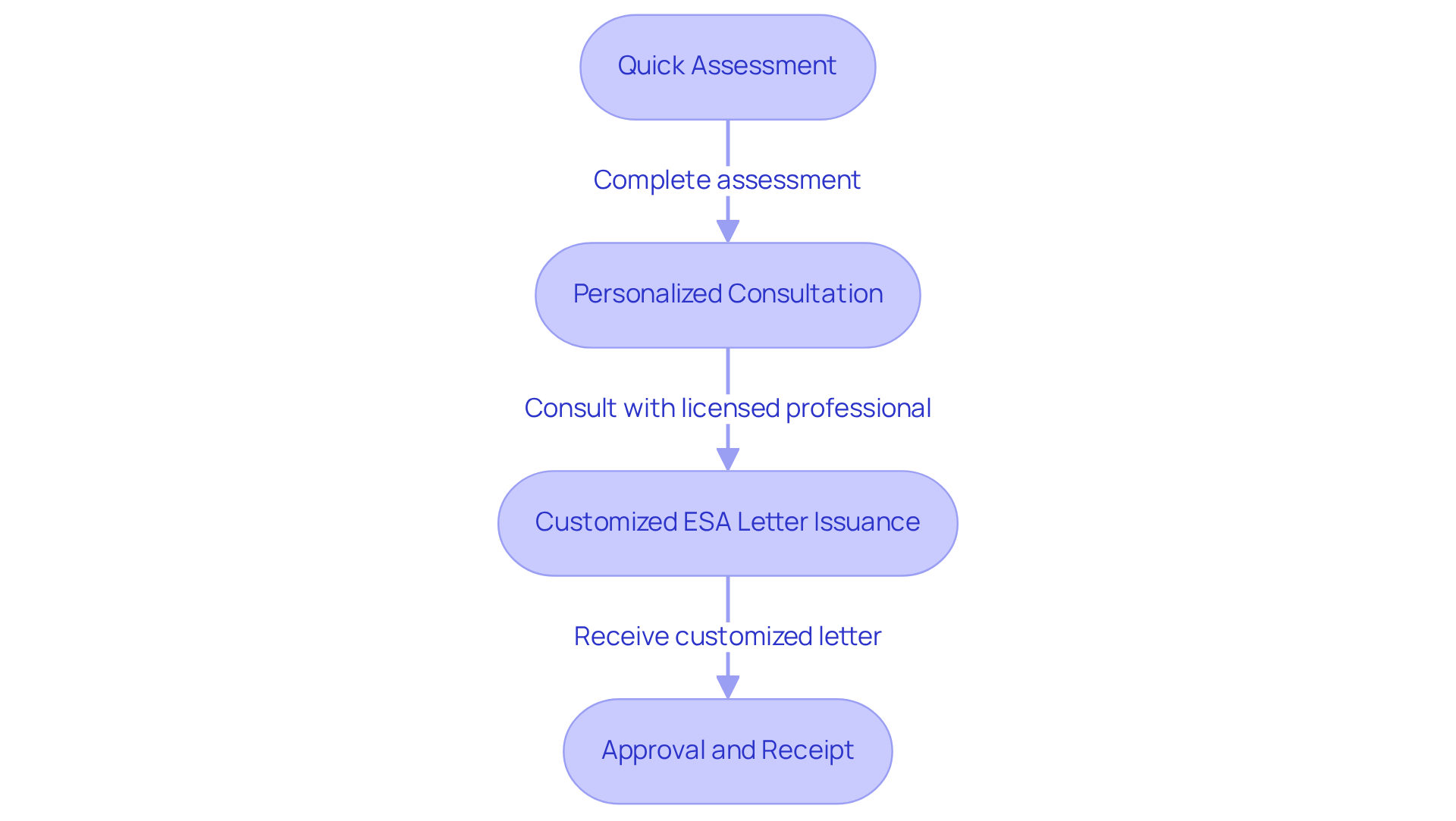
Legal Definition of Service Animals Under the ADA
Under the Americans with Disabilities Act (ADA), a service animal is defined as a dog that has been individually trained to perform tasks for a person with a disability. These tasks can include:
- Guiding individuals who are blind
- Alerting those who are deaf
- Providing support during a seizure
On the other hand, the esa dog requirements do not include specialized training to perform specific tasks; they primarily offer companionship to alleviate emotional distress. This fundamental difference in training and purpose means that service animals enjoy broader access rights in public spaces, including restaurants, hotels, and public transportation, while esa dog requirements do not afford the same legal protections.
For instance, assistance dogs can accompany their handlers in nearly all public areas, whereas ESAs often face restrictions, particularly in places where animals are typically prohibited. This distinction is crucial for individuals seeking the therapeutic benefits of pet companionship, as it influences their rights and the accommodations they can expect under esa dog requirements in various settings.
Reflecting on these differences can be overwhelming for those navigating their rights and needs. If you find yourself struggling with emotional challenges, know that there is support available. An ESA letter can serve as a compassionate solution, granting you the comfort and companionship you deserve. Remember, you are not alone in this journey, and the support of an ESA can significantly enhance your quality of life.
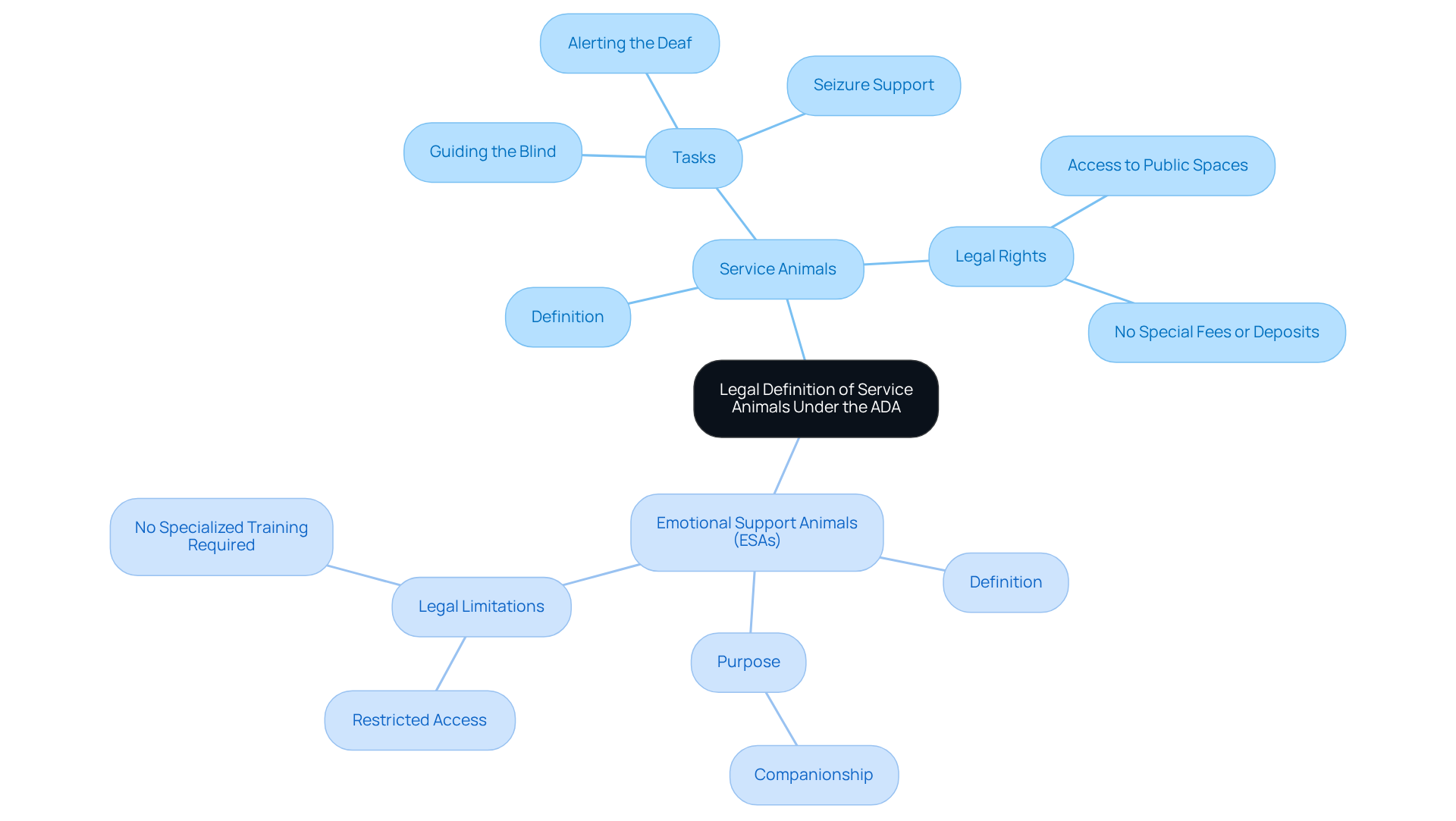
Therapeutic Needs Addressed by ESA Dogs
Emotional support animals, especially dogs, fulfill ESA dog requirements by addressing therapeutic needs such as anxiety, depression, PTSD, and feelings of isolation. Their comforting presence can significantly alleviate stress and enhance emotional well-being. A survey reveals that 73% of ESA guardians rated their pets’ effectiveness in improving mental health as eight or higher on a scale of one to ten, underscoring the profound impact these animals have on their caretakers’ lives.
Real-life stories further illuminate the transformative power of ESAs. Many individuals share that their dogs help ease feelings of anxiety and depression, providing a sense of stability and security. During the COVID-19 pandemic, 62% of ESA owners reported improved mental health, in stark contrast to only 19% of those without an ESA. This striking difference emphasizes the crucial role emotional support creatures play during challenging times.
According to ESA dog requirements, canines are particularly effective in supporting individuals grappling with PTSD and feelings of isolation. Their unconditional love and loyalty create a safe haven for those navigating traumatic experiences, fostering connection and reducing feelings of loneliness. Psychologists note that the bond between humans and their emotional support companions is essential for mental health treatment, as these beings not only offer companionship but also inspire individuals to engage more fully with their surroundings.
James B. shares his positive experience with Wellness Wag, stating, “Thanks to Wellness Wag, I received approval for my ESA quickly and without any difficulties. Their staff is friendly and caring.” This testimonial highlights the streamlined online process for obtaining ESA letters, ensuring clients feel supported and understood.
In summary, the therapeutic benefits of ESA animals are well-documented, making them invaluable allies for those facing mental health challenges. Wellness Wag also provides flexible payment plans starting as low as $32.25, making it easier for working professionals to access the support they need. Remember, you are not alone in this journey; compassionate support is available to help you navigate your emotional landscape.
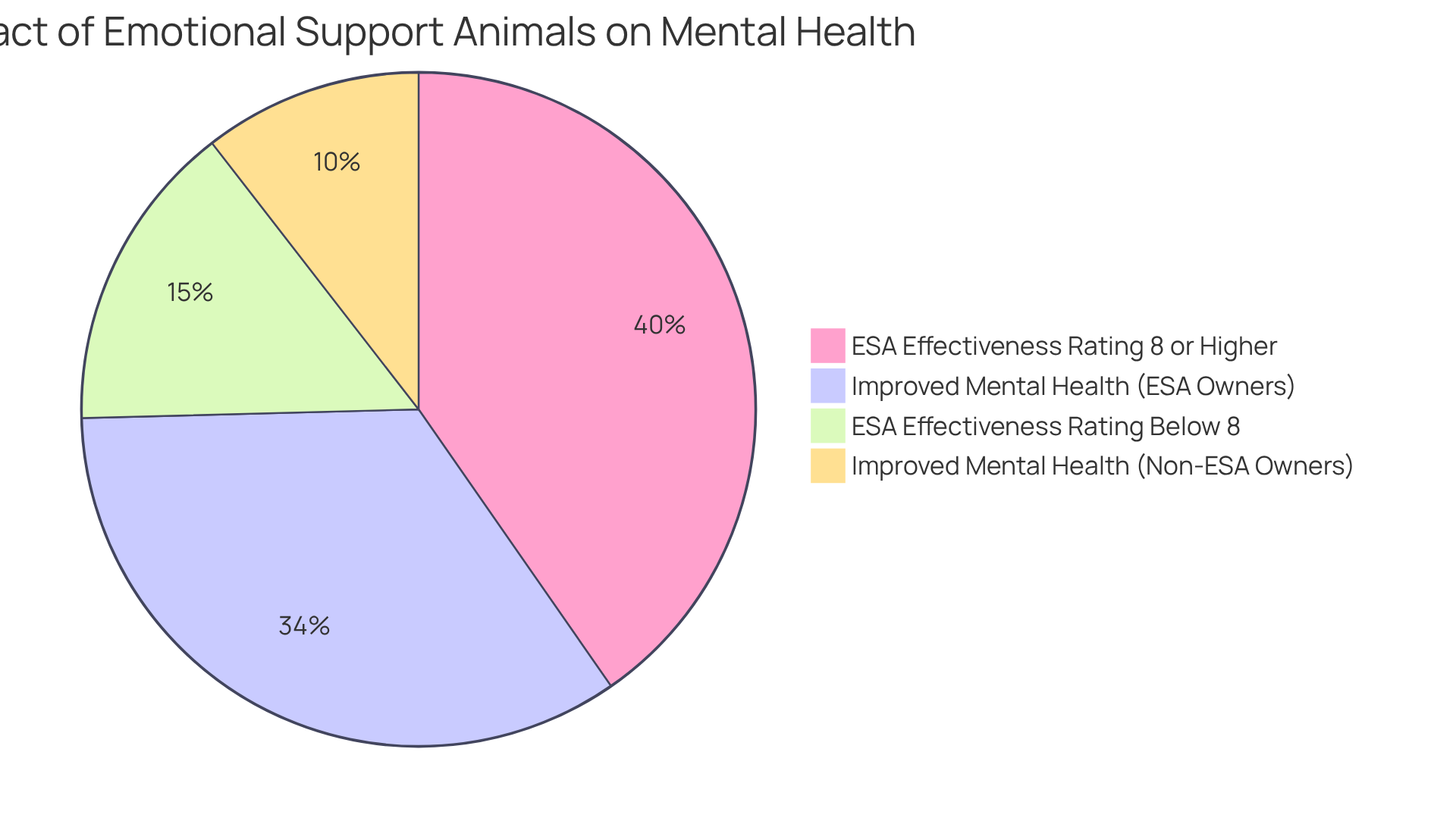
Essential Documentation for ESA Dog Travel and Housing
Traveling or securing housing with an Emotional Support Animal (ESA) can be challenging, especially for those grappling with mental health issues. It’s important to have the right documentation to meet ESA dog requirements, primarily an ESA letter issued by a licensed mental health professional. This letter serves as a vital tool, clearly articulating the individual’s need for an ESA dog due to a diagnosed mental health condition, which is essential for compliance with legal requirements.
When it comes to air travel, additional documentation may be required, including proof of vaccinations and health certificates to meet the ESA dog requirements. Given that airline policies can vary significantly, it’s crucial to check the specific ESA dog requirements of your chosen airline before flying. Have you ever felt overwhelmed by the thought of traveling with your emotional support companion? You’re not alone. Statistics show that an increasing number of airlines are recognizing the importance of ESAs, reflecting a growing acknowledgment of their role in supporting mental health.
Mental health experts emphasize the significance of having valid ESA letters. These letters not only facilitate easier access to housing under the Fair Housing Act but also help reduce travel-related stress for individuals who depend on their emotional support companions. Remember, you are not just navigating regulations; you are seeking the support that can make a meaningful difference in your life. With the right documentation, you can travel and find housing with greater peace of mind, knowing that your ESA is there to support you every step of the way.

Training Requirements for Emotional Support Dogs
While emotional support animals (ESAs) may not require specialized training like service animals, basic obedience training is highly recommended. This foundational training is vital in ensuring that dogs exhibit good behavior in public settings, which is essential for the safety of the pet and the comfort of those around them. Commands such as ‘sit,’ ‘stay,’ and ‘come’ play a crucial role in managing a dog’s behavior and preventing misunderstandings in various environments.
Statistics reveal that approximately 47.5% of ESA caregivers have attended multiclass training courses, highlighting the commitment many have toward their pets’ training. Furthermore, 30% of surveyed dog caregivers participated in a multiweek course and obtained a certificate, emphasizing the dedication to proper training among pet guardians. Trainers emphasize that fundamental obedience training not only enhances a dog’s conduct but also strengthens the bond between the pet and its caregiver. As one expert beautifully noted, “The greatest gift of training is that it increases the dog’s ability to handle liberty,” underscoring the importance of teaching dogs to respond appropriately to commands.
Incorporating basic obedience training into the routine of ESA care can significantly enhance the overall experience for both the caregiver and the animal, while also satisfying the ESA dog requirements, fostering a more harmonious relationship and ensuring that the emotional support provided is both effective and dependable. Additionally, with dog training costs ranging from $30 to $80 per class, investing in training can be a manageable expense for many pet caregivers. Notably, 94% of households engage in some form of dog training at home, demonstrating that training is a widespread and caring practice among dog caregivers.
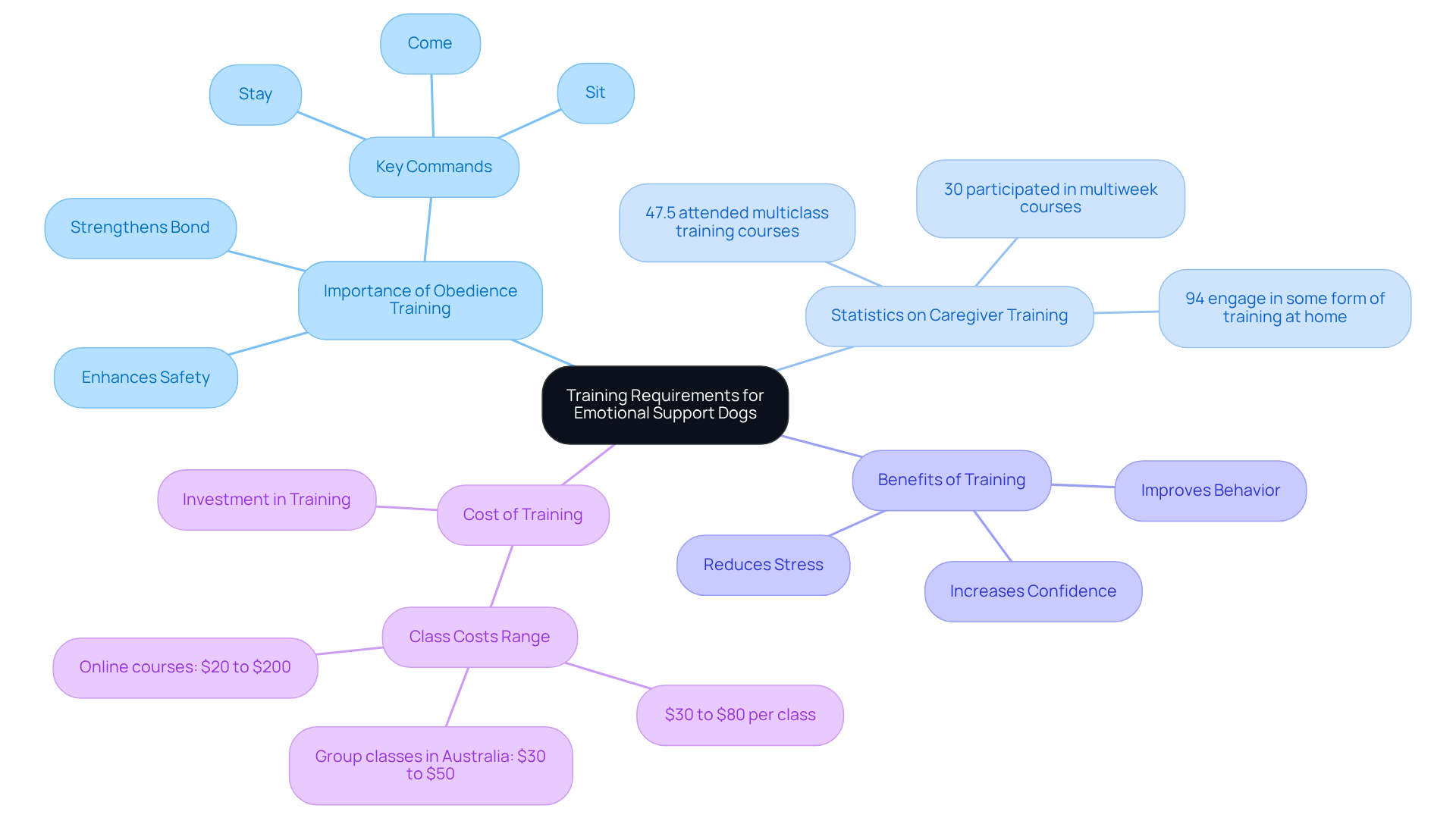
Rights of ESA Dog Owners in Housing and Travel
Under the Fair Housing Act, caregivers of emotional support animals (ESAs) are granted specific rights that require landlords to accommodate tenants with these beloved companions, even in properties that have no-pet policies. This legal framework is designed to protect individuals facing mental health challenges, ensuring they can live with their support animals without incurring additional financial burdens, such as pet fees or breed restrictions.
It’s essential to understand that emotional support animals differ from service dogs; while ESA dog requirements focus on providing emotional comfort and assistance to those with psychological or emotional disorders, they are not trained to perform specific tasks and do not share the same legal rights and access to public spaces as service dogs under the ADA. Studies indicate that approximately 18% of pet guardians in the U.S. have emotional support animals, highlighting the growing recognition of their vital role in mental health treatment.
When it comes to travel, while airlines are not mandated to accept emotional support animals, those that do must allow them to accompany their guardians, provided the necessary documentation is in order. Typically, this documentation includes a valid ESA letter from a licensed mental health professional, which affirms the individual’s ESA dog requirements.
Although compliance among landlords regarding ESA accommodation requests can vary, many are becoming increasingly aware of their responsibilities under the Fair Housing Act. Clear communication and the right documentation can significantly enhance the chances of successful accommodation. ESA owners are encouraged to have their ESA dog requirements letter ready when seeking housing, as this can help ease the process.
Moreover, landlords who deny ESA requests without valid reasons may face legal consequences, underscoring the importance of understanding both tenant rights and landlord responsibilities. The experiences of countless ESA owners who have successfully navigated housing challenges serve as a testament to the effectiveness of having proper documentation and fostering open communication with landlords.
Have you or someone you know faced similar challenges? Remember, you are not alone, and support is available to help you through this journey.
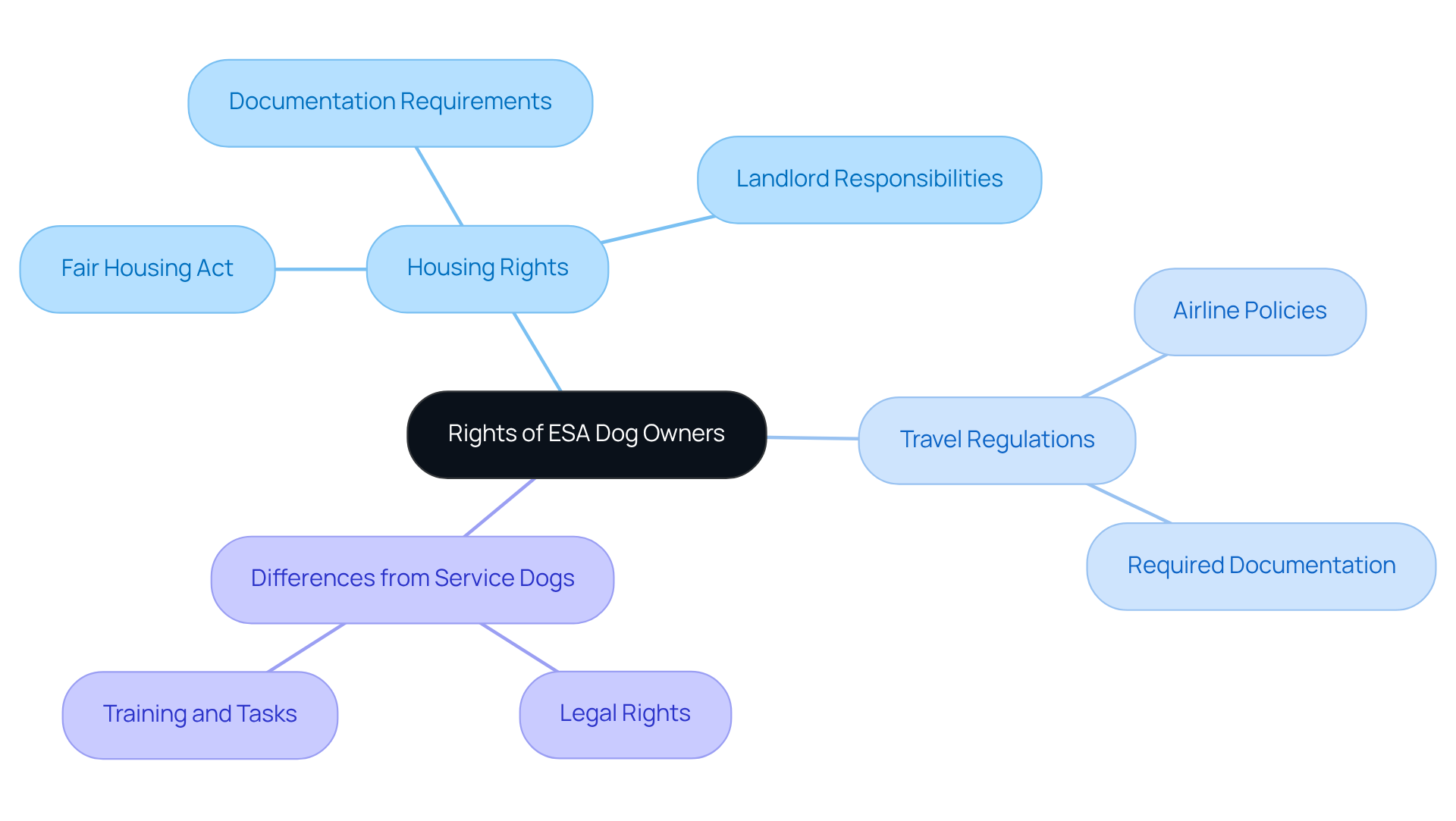
Public Space Restrictions for ESA Dogs
Emotional Support Animals (ESAs) offer comfort and companionship, but it’s important to understand that they do not have the same access rights as service animals in public spaces. Unlike service animals, which are specifically trained to perform tasks for individuals with disabilities, ESAs primarily serve to provide emotional support. This distinction can lead to confusion, particularly in places where pets are prohibited, such as restaurants, retail stores, and public transportation. Recognizing this difference is vital for ESA holders, as it helps prevent misunderstandings and ensures compliance with local regulations.
Many ESA caregivers report a positive impact on their mental health—approximately 88% according to recent statistics. However, a significant number remain unaware of the limitations surrounding public access related to ESA dog requirements. Legal experts emphasize that businesses are not required to comply with ESA dog requirements in their establishments, which can result in varying policies from one place to another. For example, while some restaurants may welcome ESAs, others may strictly enforce no-pet policies, regardless of any documentation presented.
In states like California and Colorado, laws support ESA housing rights, yet these protections do not extend to public access. This inconsistency underscores the importance of understanding state-specific regulations, as the ESA dog requirements can vary greatly. Being aware of these limitations is crucial for ESA handlers, allowing them to effectively navigate their rights and avoid potential conflicts in public settings. Remember, you are not alone in this journey; support is available to help you understand and advocate for your needs.
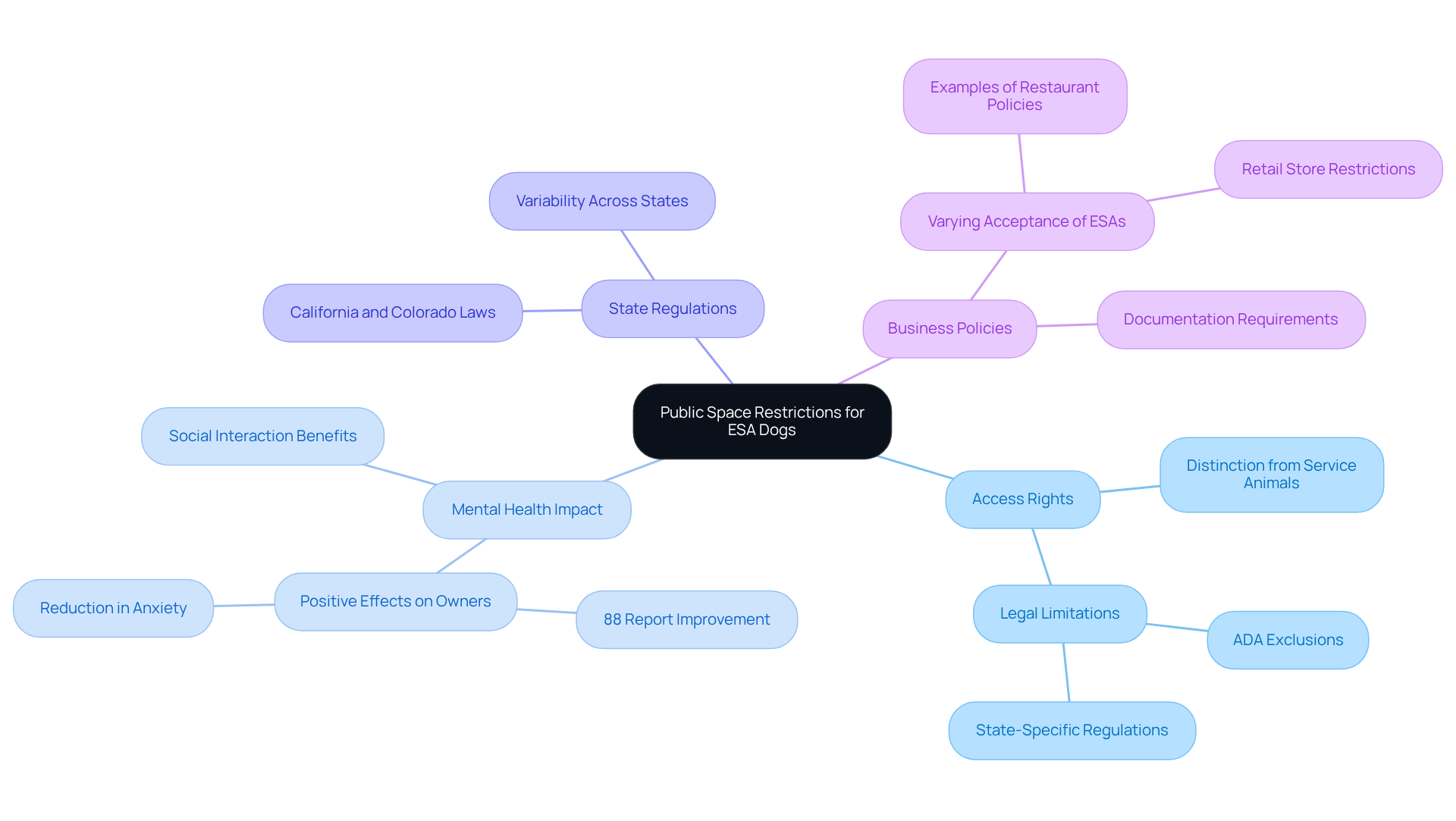
Role of Mental Health Professionals in ESA Certification
Licensed mental health professionals play a vital role in the Emotional Support Animal (ESA) certification process. They compassionately evaluate individuals’ mental health needs to determine the appropriateness of an ESA. An ESA letter, which must be issued by a licensed professional, serves as official documentation that validates the pet’s status, ensuring recognition by housing providers and airlines. This letter not only facilitates access to pet-restricted accommodations but also highlights the importance of a thorough assessment process.
Imagine the relief of knowing that a furry companion can help ease your emotional burdens. Expert opinions suggest that a compassionate evaluation can significantly enhance the effectiveness of the ESA in addressing mental health challenges. In fact, 62% of ESA guardians indicate that their pets have notably decreased their stress and anxiety levels. When selecting a mental health professional for ESA letters, it’s essential to prioritize those with experience in assessing emotional support needs and understanding ESA dog requirements. This ensures a comprehensive understanding of both the legal requirements, including the Fair Housing Act and air travel regulations, as well as the therapeutic benefits of ESAs.
Many clients have shared their positive experiences in obtaining ESA letters through Wellness Wag, reinforcing the importance of professional guidance in this process. Their testimonials illustrate how a supportive professional can make all the difference, emphasizing that you are not alone on this journey. Remember, the right support is available to help you navigate these challenges with understanding and care.
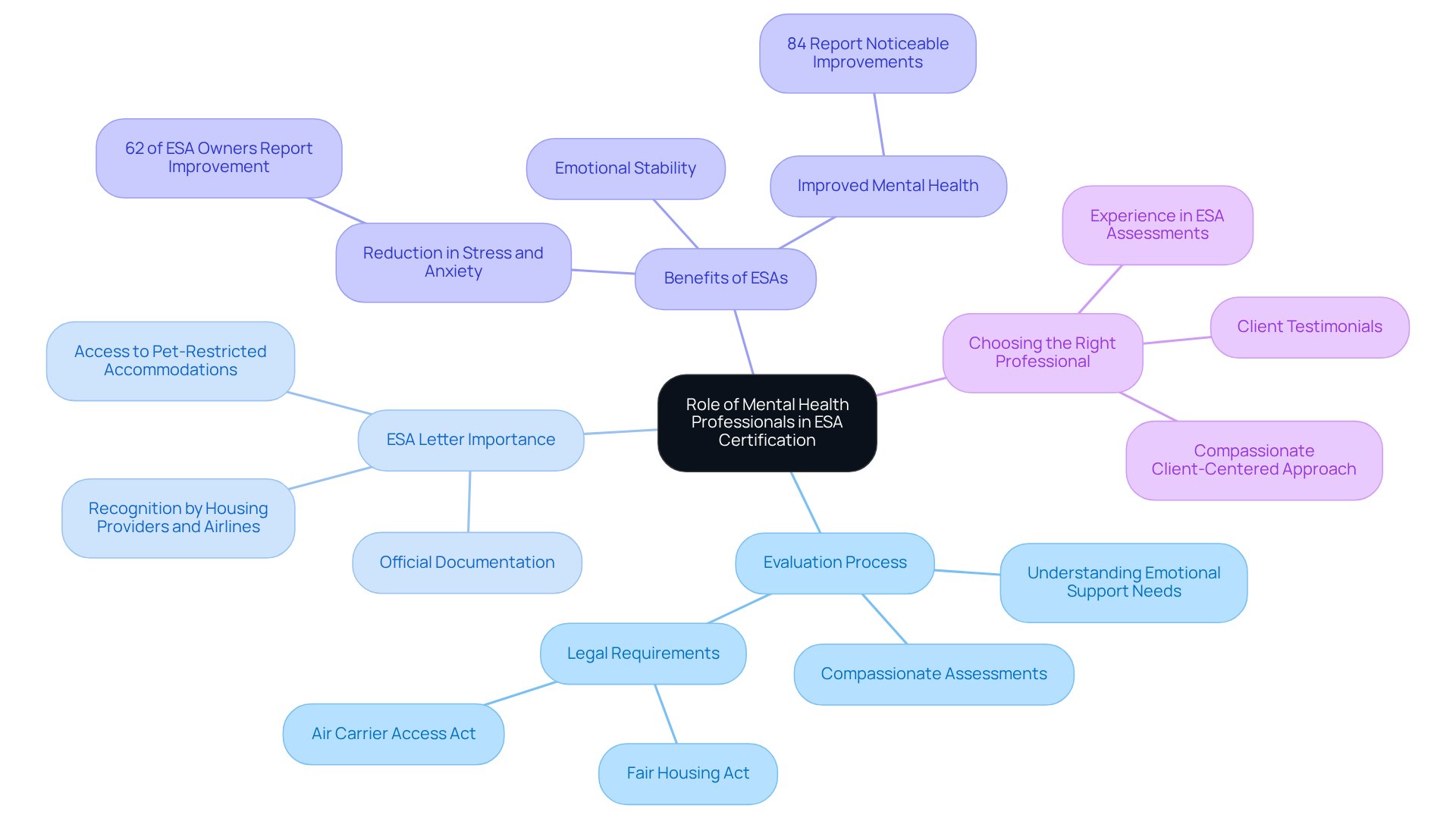
Differences Between Emotional Support Animals and Therapy Dogs
Emotional support animals (ESAs) and therapy canines serve unique yet vital roles in providing support to those in need. For many, ESAs offer a comforting presence and companionship, easing the emotional distress often associated with conditions like anxiety and depression. In contrast, therapy animals are specially trained to assist multiple individuals in various environments, such as hospitals, schools, and nursing homes, where they provide essential emotional support and comfort.
However, the distinction between these two types of support animals can sometimes be confusing. While therapy animals undergo specialized training and certification, ESAs do not require formal training. This lack of clarity is underscored by recent studies indicating that only 30% of individuals fully understand the differences between ESAs and therapy animals. This highlights the pressing need for increased awareness and understanding.
It’s also important to recognize that service animals are distinct from both ESAs and therapy animals. Under the Americans with Disabilities Act (ADA), service animals have specific legal rights. Although there’s no legal requirement for service animals to be certified or registered, obtaining certification can lend credibility and ensure that the animal has received proper training. Service animal owners enjoy full public access rights, allowing them to bring their animals into various public spaces, including restaurants, stores, libraries, and public transportation, as well as housing accommodations where pets might typically be restricted.
Real-world examples illustrate the profound impact therapy animals can have across different settings. For instance, therapy canines have been integrated into classrooms to help alleviate anxiety and enhance social skills among students. Remarkably, more than 50% of children with autism show increased interest in attending school when interacting with these loving pets. Additionally, therapy animals are often utilized in hospitals, providing comfort to patients and demonstrating their crucial role in enhancing emotional well-being.
Experts in animal behavior emphasize the importance of both ESAs and therapy canines in mental health care. They highlight that while ESAs provide essential companionship, therapy dogs play a pivotal role in fostering emotional stability and encouraging social interaction in various therapeutic contexts. Understanding these distinctions is vital for individuals seeking the right type of support companion that meets ESA dog requirements to address their unique needs. Moreover, it’s noteworthy that 88% of ESA guardians report a positive effect on their mental well-being, underscoring the significant role ESAs play in mental health treatment. To ensure you choose the right support companion, it is important to consider the ESA dog requirements along with your specific needs and the roles these wonderful animals can fulfill.
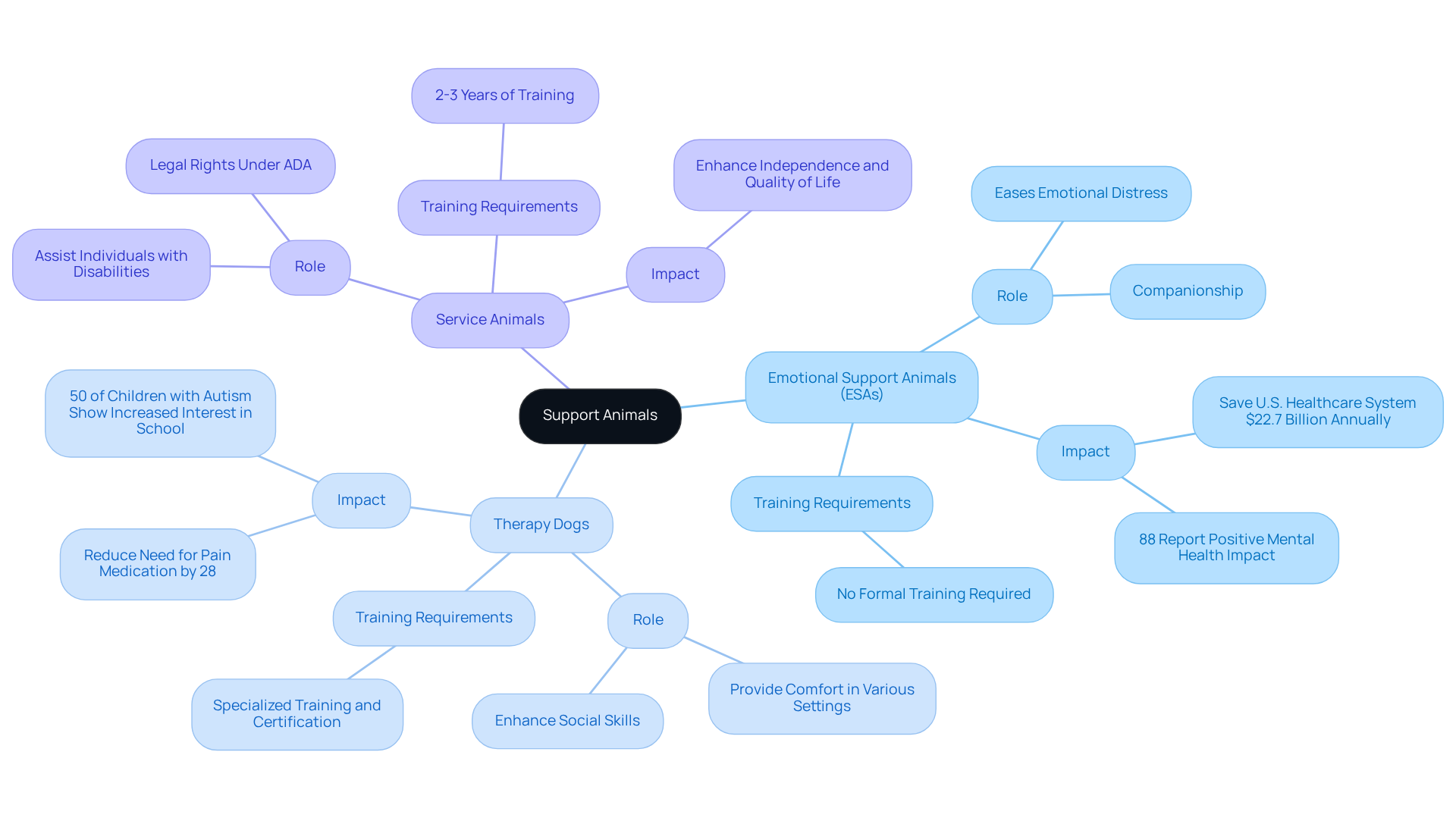
Benefits of Pet Insurance for ESA Dog Owners
Pet insurance offers essential support for ESA dog caregivers by covering unexpected veterinary expenses, including accidents, illnesses, and routine care. As the costs of veterinary services continue to rise—evidenced by a 7.9% increase in urban areas from February 2023 to February 2024—having insurance can significantly ease the financial burden many face. It’s heartening to know that approximately 67.6% of dog caretakers now have pet health insurance, reflecting a growing awareness among pet guardians about the importance of securing financial protection for their beloved companions.
Many insurance plans provide customizable coverage options, allowing individuals to select what best suits their unique needs. For instance, ESA guardians often share stories of the relief they experience from having pet insurance, enabling them to focus on their pets’ well-being rather than the anxiety of unforeseen veterinary costs. Financial experts emphasize that managing veterinary expenses through insurance can lead to better health outcomes for pets, as those with coverage are more likely to seek necessary care promptly.
This trend underscores the vital role of pet insurance in supporting the emotional and financial well-being of caregivers who meet ESA dog requirements. Furthermore, the average yearly premium for accident and illness coverage for dogs is around $599.03, a significant consideration for those assessing ESA dog requirements. Alarmingly, 23% of pet owners have indicated that they lack the funds to cover veterinary care, highlighting the financial strain many endure and reinforcing the critical importance of pet insurance.
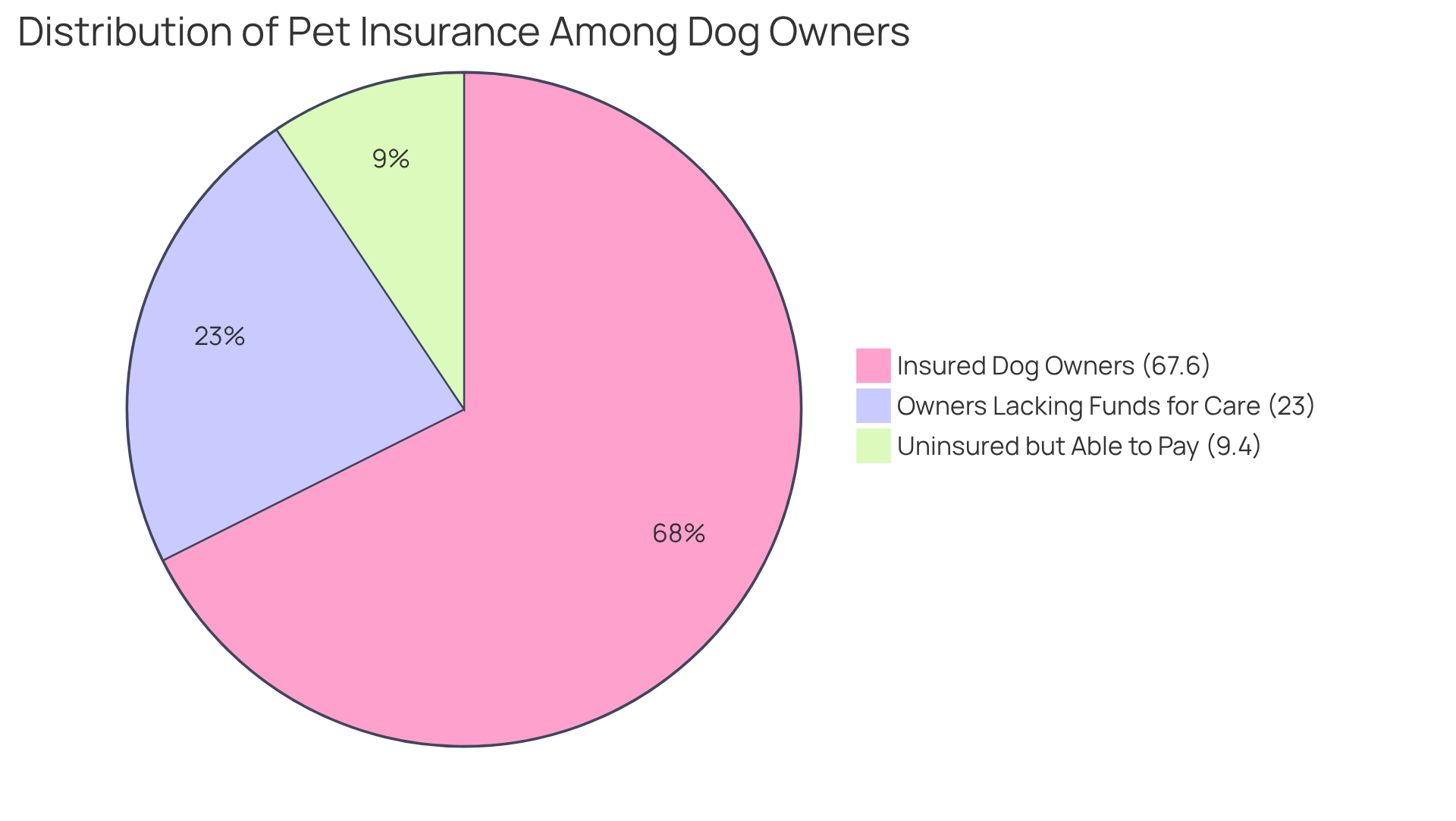
Conclusion
Understanding the emotional challenges you may face during difficult times is crucial. Many individuals seek companionship and comfort, and Emotional Support Animals (ESAs) can play a vital role in this journey. Obtaining a legitimate ESA letter is significant, as it not only legitimizes your need for support but also distinguishes ESAs from service animals, highlighting the therapeutic roles these companions play in enhancing mental health.
Navigating the necessary documentation, training, and rights associated with ESAs can feel overwhelming. However, by taking proactive steps, you can create a supportive environment that fosters emotional well-being. It’s important to recognize the legal definitions and access rights for ESAs compared to service animals, ensuring you have the proper documentation for housing and travel. Basic training for your ESA is equally essential, as it promotes good behavior and a harmonious relationship.
The transformative impact of ESAs on mental health cannot be overstated. Many individuals have shared their stories of how their emotional support companions have provided comfort and companionship during challenging times. Mental health professionals also play a crucial role in the certification process, ensuring that you receive the support you need.
As you consider the possibility of welcoming an ESA into your life, remember that understanding the requirements is vital. Whether it’s obtaining an ESA letter, exploring training options, or considering pet insurance, each step you take contributes to a more fulfilling experience with your emotional support companion. The journey toward emotional healing and support is supported by resources and communities dedicated to helping individuals thrive alongside their beloved ESAs. You are not alone in this journey; support is available, and together, we can navigate this path toward a brighter future.
Frequently Asked Questions
What is Wellness Wag and how does it assist individuals seeking ESA letters?
Wellness Wag is an online platform designed to simplify the process of obtaining a legitimate Emotional Support Animal (ESA) letter for individuals facing emotional challenges. They provide a streamlined process that includes a quick assessment of your situation, personalized consultations with licensed medical professionals, and customized ESA letters.
What steps are involved in obtaining an ESA letter through Wellness Wag?
The process involves starting with a quick assessment to share your emotional support needs, followed by a personalized consultation with licensed medical professionals. After evaluation, a customized ESA letter is issued, which is signed by a licensed provider.
How quickly can I receive my ESA letter from Wellness Wag?
Once approved, you will receive your official ESA letter within 24 hours, available in both digital and hardcopy formats.
What is the legal definition of service animals under the ADA?
Under the Americans with Disabilities Act (ADA), a service animal is defined as a dog that has been individually trained to perform specific tasks for a person with a disability, such as guiding individuals who are blind or alerting those who are deaf.
How do Emotional Support Animals (ESAs) differ from service animals?
ESAs primarily provide companionship to alleviate emotional distress and do not require specialized training to perform specific tasks. This means that service animals have broader access rights in public spaces compared to ESAs, which often face restrictions in places where animals are typically prohibited.
What therapeutic needs do ESA dogs address?
ESA dogs help address therapeutic needs such as anxiety, depression, PTSD, and feelings of isolation. Their presence can significantly alleviate stress and enhance emotional well-being.
What evidence supports the effectiveness of ESAs in improving mental health?
Surveys indicate that 73% of ESA guardians rated their pets’ effectiveness in improving mental health as eight or higher on a scale of one to ten. Additionally, during the COVID-19 pandemic, 62% of ESA owners reported improved mental health compared to only 19% of those without an ESA.
Are there any financial options available for obtaining an ESA letter through Wellness Wag?
Yes, Wellness Wag offers flexible payment plans starting as low as $32.25, making it more accessible for individuals seeking support.
Certify Your Emotional Support Animal Today

Why You Can Rely on Us?
At Wellness Wag, we believe your pet deserves care rooted in both science and compassion. Each article is carefully researched, written in clear language for pet owners, and then reviewed by qualified professionals to ensure the information is evidence-based, current, and practical for real-life care. Our goal is to help you feel confident in making informed decisions about your pet’s health and well-being.
Reviewed by
Angela Morris, MSW, LCSW
Angela is a licensed clinical social worker with 20 years of experience in patient advocacy and community mental health. She has assisted numerous clients with ESA evaluations and brings a deep understanding of disability accommodations, ensuring that all information is accurate, supportive, and practical.

Written by :
Lena Park
Last Updated :
July 13, 2025












